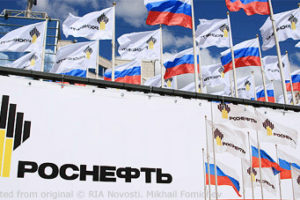Rosneft Privatization Deal Closed As Italian Financing Comes Through

(Moscow Times – themoscowtimes.com – January 4, 2017)
The tumultuous privatization saga of Russia’s largest oil company appears to be drawing to a close.
Swiss-British commodities trading firm Glencore and the Qatari Sovereign Wealth Fund have closed a deal to purchase 19.5 percent of state-controlled Rosneft, according to a statement on Glencore’s website.
The news was followed by an announcement that Italy’s Intesa Sanpaolo bank would provide a loan of up to 5.2 billion euros ($5.4 billion) – half the cash required for the deal. The bank had previously wavered on its involvement with Rosneft’s privatization.
Intesa will seek to involve other banks in financing the deal. Each member of the proposed syndicate will take on part of the loan, an Intesa spokesperson told Reuters.
The developments bring a modicum of clarity to Rosneft’s otherwise opaque privatization deal.
After months of struggling to find a foreign investor for Rosneft, Russian President Vladimir Putin and CEO Igor Sechin announced in December that the Glencore-Qatar consortium would purchase the share packet. The unexpected deal reportedly came after talks with 30 different potential investors.
Putin termed the sale “the largest on the global energy market in 2016.”
Since then, however, many have cast doubt on the honesty of this “privatization.” In the deal’s wake, Glencore and Rosneft announced that the 19.5 percent share had been valued at 10.2 billion euros ($10.6 billion). The Glencore-Qatar consortium would pay 2.8 billion euros ($2.9 billion) and Intesa Sanpaolo and several unnamed Russian banks would provide a loan of 7.4 billion euros ($7.7 billion) – with Intesa providing more than 50 percent of the financing.
Shortly thereafter, however, Intesa seemed to reconsider its role in financing the sale due to EU sanctions against Rosneft.
At the time, several economic analysts interviewed by the Moscow Times said that the privatization scheme more resembled sophisticated accounting than true privatization. The real money, they suggested, was probably coming from Russian banks backed by the Russian Central Bank – with Glencore and the Qatari Fund serving as cover for the process.
The problem, analyst Boris Grozovsky said, was that the Russian banks had gone into debt to finance the deal, and were partially relying on money from Intesa to come through.
Those funds now appear to have arrived.
